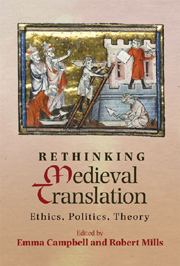Book contents
- Frontmatter
- Contents
- List of Illustrations
- List of Contributors
- Acknowledgements
- Introduction: Rethinking Medieval Translation
- 1 On Not Knowing Greek: Leonzio Pilatus's Rendition of the Iliad and the Translatio of Mediterranean Identities
- 2 Translation and Transformation in the Ovide moralisé
- 3 Translating Lucretia: Word, Image and ‘Ethical Non-Indifference’ in Simon de Hesdin's Translation of Valerius Maximus's Facta et dicta memorabilia
- 4 Translating Catharsis: Aristotle and Averroës, the Scholastics and the Basochiens
- 5 The Ethics of Translatio in Rutebeuf's Miracle de Théophile
- 6 Invisible Translation, Language Difference and the Scandal of Becket's Mother
- 7 Medieval Fixers: Politics of Interpreting in Western Historiography
- 8 The Task of the Dérimeur: Benjamin and Translation into Prose in Fifteenth-Century French Literature
- 9 The Translator as Interpretant: Passing in/on the Work of Ramon Llull
- 10 Rough Translation: Charles d'Orléans, Lydgate and Hoccleve
- 11 Bueve d'Hantone/Bovo d'Antona: Exile, Translation and the History of the Chanson de geste
- Untranslatable: A Response
- Bibliography
- Index
6 - Invisible Translation, Language Difference and the Scandal of Becket's Mother
Published online by Cambridge University Press: 05 April 2013
- Frontmatter
- Contents
- List of Illustrations
- List of Contributors
- Acknowledgements
- Introduction: Rethinking Medieval Translation
- 1 On Not Knowing Greek: Leonzio Pilatus's Rendition of the Iliad and the Translatio of Mediterranean Identities
- 2 Translation and Transformation in the Ovide moralisé
- 3 Translating Lucretia: Word, Image and ‘Ethical Non-Indifference’ in Simon de Hesdin's Translation of Valerius Maximus's Facta et dicta memorabilia
- 4 Translating Catharsis: Aristotle and Averroës, the Scholastics and the Basochiens
- 5 The Ethics of Translatio in Rutebeuf's Miracle de Théophile
- 6 Invisible Translation, Language Difference and the Scandal of Becket's Mother
- 7 Medieval Fixers: Politics of Interpreting in Western Historiography
- 8 The Task of the Dérimeur: Benjamin and Translation into Prose in Fifteenth-Century French Literature
- 9 The Translator as Interpretant: Passing in/on the Work of Ramon Llull
- 10 Rough Translation: Charles d'Orléans, Lydgate and Hoccleve
- 11 Bueve d'Hantone/Bovo d'Antona: Exile, Translation and the History of the Chanson de geste
- Untranslatable: A Response
- Bibliography
- Index
Summary
The translator's invisibility has been identified by Lawrence Venuti as a major ethical dilemma facing contemporary practitioners of translation. The tendency, especially within English-language translations commissioned by commercial publishers, to efface the translator's labour through the promotion of ‘fluent’ translation techniques and unreflexive reading practices is symptomatic of an attitude that is, Venuti maintains, ‘imperialistic abroad and xenophobic at home’. Although Venuti's account of this trend begins in the seventeenth century, after which it becomes increasingly yoked to the demands of corporate capital, invisible translation is also of course a premodern phenomenon. The story of medieval Europe is a story of languages in contact, yet the precise mechanisms through which exchanges across linguistic frontiers were effected only come into focus intermittently in literature of the period. One text that famously draws attention to the problem of language difference while simultaneously effacing it is Chaucer's Man of Law's Tale. First, the tale's protagonist, Custance, is married off to the sultan of Syria, following reports of her beauty by Roman merchants. This traffic in women, goods, power and knowledge takes place without any explicit acknowledgement of linguistic borders between sixth-century Syria and Rome. No mention here of an interpreter at the wedding, or fumbled linguistic exchanges between Custance's entourage and that of her husband-to-be.
- Type
- Chapter
- Information
- Rethinking Medieval TranslationEthics, Politics, Theory, pp. 125 - 146Publisher: Boydell & BrewerPrint publication year: 2012

